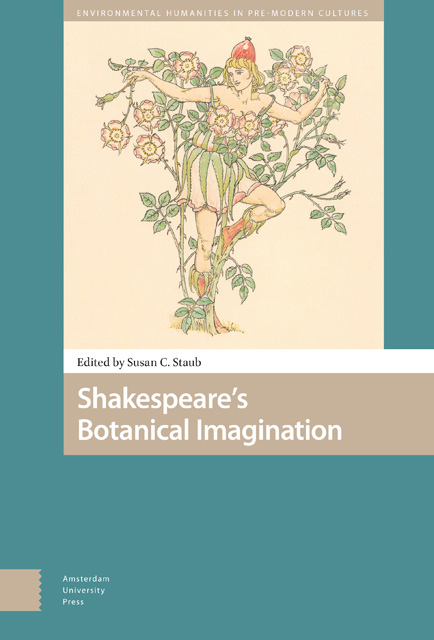11 - Botanomorphism and Temporality : Imagining Humans as Plants in Two Shakespeare Plays
Published online by Cambridge University Press: 17 October 2023
Summary
Abstract
This essay examines instances in two plays by Shakespeare, Richard II and The Winter’s Tale, in which characters are given the qualities of plants. This is not anthropomorphism, but what I call “botanomorphism.” Inspired by Michael Marder’s exposition of “plant-thinking,” I focus on how botanomorphism influences time in the plays. In Richard II, different characters are imbued with lives that are longer or shorter, depending on the plants with which they are associated. In The Winter’s Tale, Hermione takes on the life cycle of a perennial plant that goes dormant and then returns to life, seemingly miraculously. In both, I argue that a limited human view is eschewed for the botanomorphic perspective of plants, lending a wider, more ecological vision of the events.
Keywords: plant-thinking, vegetal time, plant ontology, politics, critical plant studies
Plants, for early modern people, were a locus of meaning and knowledge production that provoked some of their most profound questions about embodiment, the ontological permeability and limits of human bodies, and the diffusion of sentience in the natural world. The many appearances plants make in the literature and science of the period often complicate the Aristotelian hierarchy of human-animal-plant. In this essay I posit a practice in early modern literature, not of anthropomorphism (a charge that could be, and has been, levelled at Shakespeare, whose plays I consider) but of botanomorphism, according to which humans or human characters are endowed with the characteristics, physical and ontological, of plants, in a kind of extreme metaphor. I focus on Richard II but turn briefly to The Winter’s Tale, examining metaphors that suggest deep relations between human and vegetable. In both plays, the characters take on qualities of vegetable life, as imagined in a necessarily limited human way. Early moderns understood human ontology to be comprised of or to intersect at least partly with vegetable ontology, arguably making plants fundamental to human identity. I submit that these plays are partly about what it means to be a plant. Metaphor was understood not only as an artificial or discursive construct, but also, at times, as an indicator of material reality.
- Type
- Chapter
- Information
- Shakespeare's Botanical Imagination , pp. 267 - 284Publisher: Amsterdam University PressPrint publication year: 2023



